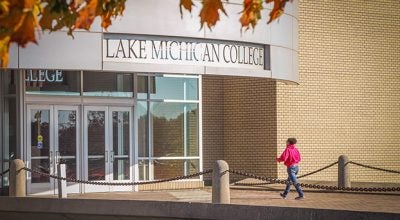Lake Michigan College joins pilot program on student retention
Published 10:39 pm Tuesday, September 11, 2012
BENTON TOWNSHIP – This fall, Lake Michigan College has joined just six other colleges nationwide that are testing new strategies to help students complete college by integrating public benefit screening and application assistance into the college’s existing services and support systems.
LMC will work with the Center for Law and Social Policy (CLASP) and the American Association of Community Colleges (AACC) to implement one of several models being tested in the Benefits Access for College Completion (BACC) initiative. The three-year, $4.84 million initiative will receive funding from the Ford Foundation, Kresge Foundation, Lumina Foundation, and the Open Society Foundations. The Annie E. Casey Foundation is also contributing to the initiative.
BACC will help low-income students, who now make up 40 percent of the student population, connect to coordinated income supports including child care subsidies and food assistance.
The initiative will be evaluated to see if low-income students who receive coordinated income supports stay in school longer and complete their studies more quickly.
Public supports and refundable tax credits can help low-income students bridge the gap between financial aid and the resources needed to attend college.
The initiative’s aim is to help students complete their studies swiftly and successfully and move into jobs earning family-sustaining wages so they will be less likely to need such supports in the future.
“Our primary goal is to increase the number of area residents with certificates and degrees. All too often, though, obstacles related to stable living situations, food, and reliable child care stand in the way of students completing their education,” said Robert Harrison, president of LMC. “This initiative is helping our students find resources to allow them to stay in school and get the education they need to enter the workforce with marketable job skills.”
In 2011, LMC became one of two Michigan community colleges to join the Michigan Benefits Network (MBA). MBA is a pilot program linking eligible students with existing public support programs with the aim of increasing student retention and graduation rates. As a result of participating in MBA, LMC was asked to join in the national BACC pilot program that has a similar mission.
Program services
Services LMC offers as part of the program include helping students complete state benefits applications, connecting student with local food banks, and directing them to the 2-1-1 system that serves Berrien, Van Buren, Cass and Allegan counties. In just the early stages of the program, the College has already assisted 28 students, six of whom were homeless or precariously housed.
Partnership in action
The provision of these builds upon the partnership between LMC and the United Way of Southwest Michigan and now includes the Michigan Association of United Ways. Through these organizations, there are two AmeriCorps workers in the community, one at LMC and one at the United Way. Together with the 2-1-1 systems these workers act in collaboration to improve services to students with documented needs
“We applaud these colleges for taking an informed and proactive look at how they can help those students most in need of financial and public support to pursue their college and career goals while dealing with work and family pressures,” said Walter Bumphus, president of AACC. “These benefits, including health insurance, food, and child care, as well as financial aid, can help them to complete credentials and get into well-paying jobs.”
“In today’s economy, it’s more important than ever that students have the supports to earn a higher education so they can land better jobs and support their families,” said Evelyn Ganzglass, director of workforce development at CLASP. “Rising college costs mean an education is increasingly out of reach for millions. By combining traditional student financial aid with public supports, students are better positioned to get by and complete their education.
And when more students earn credentials, more employers have the skilled workers they need, and the labor market is able to stay competitive.”
“These institutions have stepped up with new and creative ideas to meet the financial needs of low-income college students,” said Ford Foundation program officer Chauncy Lennon.
“This initiative will offer a space for experimentation to test whether delivering these supports on campus will ultimately increase the number of students who complete credentials, become skilled workers and succeed in our economy.”
The pilot period for this initiative will last from the fall 2012 semester through 2014, after which BACC will share the most successful strategies and lessons learned with policymakers and other community colleges nationwide to improve retention and credential completion.






